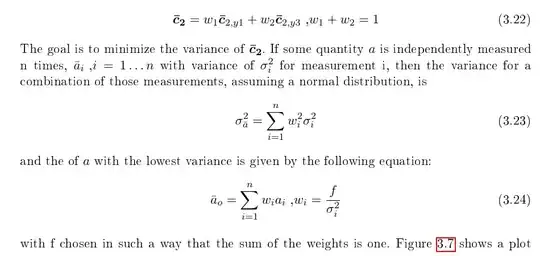I'm writing a Bachelor Thesis in engineering an a small part of it has two deal with assigning weights to independent measurements. This is from the thesis:

I am pretty sure that what equations (3.23) and (3.24) are correct, the fit my data perfectly, but I can't for the life of me find a source to confirm them. I've found two Wikipedia articles relating to them, but they don't really give any sources. Does anyone know whether what I wrote is correct, and if so, where I could find a source to cite?
http://en.wikipedia.org/wiki/Inverse-variance_weighting http://en.wikipedia.org/wiki/Weighted_arithmetic_mean#Dealing_with_variance